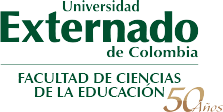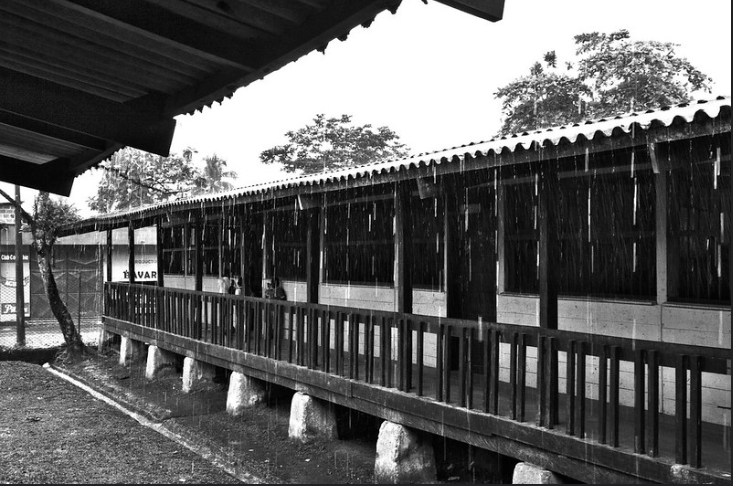9 de marzo de 2020
Rethinking the EFL Classroom
Sergio Iván Pardo Moreno
What is the purpose behind English teaching? What is taught underneath language skills? Are teachers innovating or reproducing models? Are they educating citizens and building society or just transferring linguistic rules? Are they simply teaching English for students’ job-hunting, consuming, and traveling? Are they teaching students to talk about trivial topics and obey or to think critically? Are they educating to promote competition or to help students become more sensitive human beings?
Despite the fact that the learning of the English language provides many advantages (having access to new cultures and scientific information, studying around the world, meeting foreign people, among others), the Colombian government has narrowed those advantages to the acquisition of a simple skill to make business, get jobs, and compete in the labor market. Throughout the Programa Nacional de Inglés (PNI) “Colombia very well (2015-2025)” (MEN, 2014), the government stipulates that Colombia needs high schoolers and technicians with a B2 English level to be able to work on the tourism sector, in call centers, and other economic fields that make paramount amounts of money. Nevertheless, the workforce working in those sectors has proved to receive miserable salaries. The program ignores people’s sociocultural background and evidences the government’s will to produce cheaper hand labor, since it is focused on preparing them to compete roughly at the job market. This insane competition brings back to life Spencer’s famous phrase the survival of the fittest which is “The notion that economic and social progress were the result of struggle and competition – with some individuals winning and others losing” (as cited in Paul, 1988, p. 413). Unfortunately, this has not changed sin bigotry has conquered human relations and sociocultural construction has been left aside.
Moreover, the government has adopted and implemented foreign teaching methods and guidelines defined by the Common European Framework of Reference (CEFR) for Languages. The implementation of these guidelines have not contributed to the learning of the language as it was evidenced in the last international rankings published by Education First (2019), where Colombians’ English level was poorly classified in the 68th place, among 100 countries and regions evaluated.
The English language is one of the most spoken languages around the globe. One point five billion out of the 7.5 billion people in the world speak English. This corresponds to 20% of the population worldwide. However, Lyons (2017) states that “About 360 million people speak English as their first language. In addition to being widely spoken, English is by far the most commonly studied foreign language in the world” (p. 1). Therefore, English Language Teaching (ELT) has been a great money making business for English mother language countries. In this line of thought, Bolitho (2003) says that “Publishing houses throughout the English-speaking world respond by producing mass-market course books, designed to appeal to as many teaching and learning situations as possible, thus maximizing their sales potential…” (p. 1). Likewise, these companies and institutes not only have made lots of money by selling books filled with contents, but also have reduced English language teaching to discussing superficial topics throughout unrealistic and decontextualized communicative settings. Regarding these books, Nuñez-Pardo (2018) has stated that
… their themes, contents, predominance of superficial and static aspects of hegemonic cultures, iconography, learning activities and methodologies -that do not correspond to the historic, sociocultural, economic and educational needs of local contexts- suggest that textbooks produced by foreign and local publishing houses are decontextualized. (p. 1)
How is it possible for teachers to keep talking about vacations in Paris, going on safari in Africa or getting around New York, when students can hardly afford vacation in the outskirts of their cities, when some of them do not have even the chance to travel? I strongly agree with Kumaravadivelu’s (2012) words when he affirms that “teaching should aim at a much nobler task of striving not only for educational advancement of learners but also for the personal transformation of learners and teachers” (p. 79). It is not ethical to give a class about “Ordering food in a restaurant” when students have not even had breakfast at home. Consequently, I radically believe that ELT teachers should recognize learners’ context and prepare students for life instead of constraining them to sort out unreal communicative situations in the classroom.
Colombian society and its sociohistorical issues are so particular that importing English teaching materials and methods did not succeed as it was expected. Therefore, if teachers want to help students improve their English skills, they must reconsider ELT. Núñez, Pineda and Téllez (2004) assert that teachers should be aware of immediate realities and “become sensitive to the needs of our students and to examine if the materials employed are helping them to achieve their particular language objectives” (p. 129). Hence, if teachers want to carry better processes out and obtain greater results, it is compulsory to restructure the English class by contextualizing contents, adapting objectives, and creating innovative and localized materials to attend the real necessities of Colombian students.
To make matters worse, in Colombia, EFL classes are sometimes held by teachers who do not speak English or, in the worst scenarios, native speakers without any teaching training or linguistic knowledge. These teachers tend to adopt what Kumaravadivelu (2012) declares as “a passive technician” which minimizes their roles to read instructions and turn pages over. However, if teachers want to improve ETL, it is necessary to perform the role of “a reflective practitioner, or a transformative intellectual” (Kumaravadivelu, 2012, p. 79). This means to become teachers that rethink and innovate their own practices, educators that land class topics to students’ interests, and exploits students’ creative potential, avoiding repetition, reproduction, and sameness.
Furthermore, the teacher’s role must be reconsidered. Teachers must reflect upon the way they conceive their teaching practices and the ways they apprehend and treat their students. I strongly believe that knowledge transmission is indoctrination but collective knowledge construction is education. I constantly recall Freire’s (2005) insights towards “banking education”: students are assumed as “containers” or “receptacles” to be “filled” by the teacher (p. 72). Therefore, ELT’s objective cannot be narrowed to teaching language skills: instead, language teachers have a crucial sociocultural and sociopolitical role in the classroom. With this in mind, a change must be done to enhance social construction. In Núñez-Pardo’s (2018) words, “language is a complex system human being uses to express their thoughts, ideas, feelings, dreams, fears, perceptions, arguments, and the sort” (p. 3). Consequently, language teaching must become a practice of socio-collective exchange and knowledge construction throughout communication. According to Cress and Kimmerle (2018), “Collective knowledge construction refers to a process in which people create new knowledge and new content collaboratively” (p. 3). Therefore, knowledge should not be transmitted but generated by discussion and negotiation.
In sum, the Colombian Government and the Ministry of Education (MEN) should adopt guidelines towards social construction, cultural and academic development and science evolution rather than cheap hand labor reproduction. Likewise, EFL teachers should transform their classrooms into spaces for problematizing education, discussing social issues, and strengthening critical thinking skills. This reflection is an invitation for EFL teachers to reconsider their roles by designing meaningful materials for students and avoiding falling into sameness and triviality. It is time to become the English classroom into a space for sociopolitical discussion, social tissue construction, and problem solving instance. After all, English language teachers should nurture more communicators, critical thinkers, and problem solvers instead of casual consumers.
____________________________
REFERENCES
Bolitho, R. (2003). Designing Textbooks for Modern Languages: The ELT Experience. Retrieved from: https://www.llas.ac.uk/resources/gpg/1470
Cress, U., & Kimmerle, J. (2018). Collective knowledge construction. In F. Fischer, 1. E, Hmelo-Silver, S. R Goldman & P. Reimann. International handbook of the learning sciences. (pp.137-146). Retrieved from: https://www.researchgate.net/publication/317642319_Collective_knowledge_construction
Kumaravadivelu, B. (2012) Language teacher education for a global society. A modular model for knowing, analyzing, recognizing, doing, and seeing. New York, NY: Taylor & Francis.
Freire, P. (2005). Education for critical consciousness. London, UK: Continuum.
Lyons, D. (2017). How Many People Speak English, and Where Is It Spoken? Retrieved from: https://www.babbel.com/en/magazine/how-many-people-speak-english-and-where-is-it-spoken
Ministerio de Educación Nacional. (2014) Programa Nacional de inglés, Colombia Very Well, (2015-2025). Retrieved from: https://www.mineducacion.gov.co/1759/articles-343837_Programa_Nacional_Ingles.pdf
Núñez, A., Pineda, C., & Téllez, M. F. (2004). Key Aspects for Developing your Instructional Materials. PROFILE Issues in Teachers’ Professional Development, 5(1),128-139. Retrieved from:https://revistas.unal.edu.co/index.php/profile/article/view/11220/11884
Núñez-Pardo, A. (2018). Critical interculturality to disrupt coloniality in the English textbook. Revista Virtual Cuestiones Educativas, septiembre (1-9). Bogotá: Universidad Externado de Colombia.
Paul, D. (1988). The Selection of the “Survival of the Fittest”. Journal of the History of Biology, 1(3), 411-424. DOI: 10.1007/BF00144089
___________________________
Foto tomadas por
Rodríguez-Moreno, G.F. (Photographer). (2013). Institución Educativa Luis López de Mesa, Chocó [Digital images]. Bahía Solano Chocó, Colombia. Retrieved from https://www.flickr.com/photos/feliperodriguez90/10977914355/in/album-72157637906223383/


